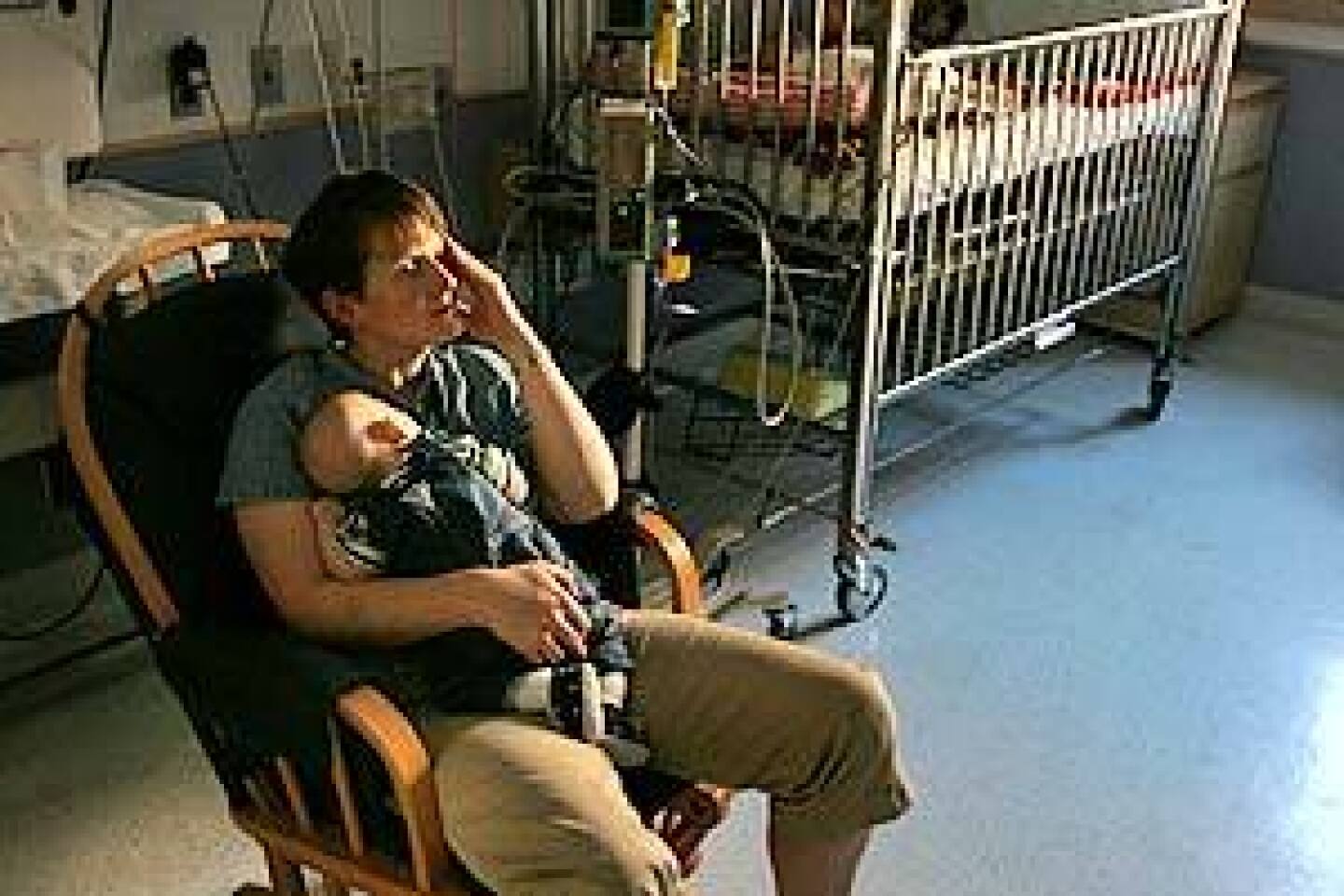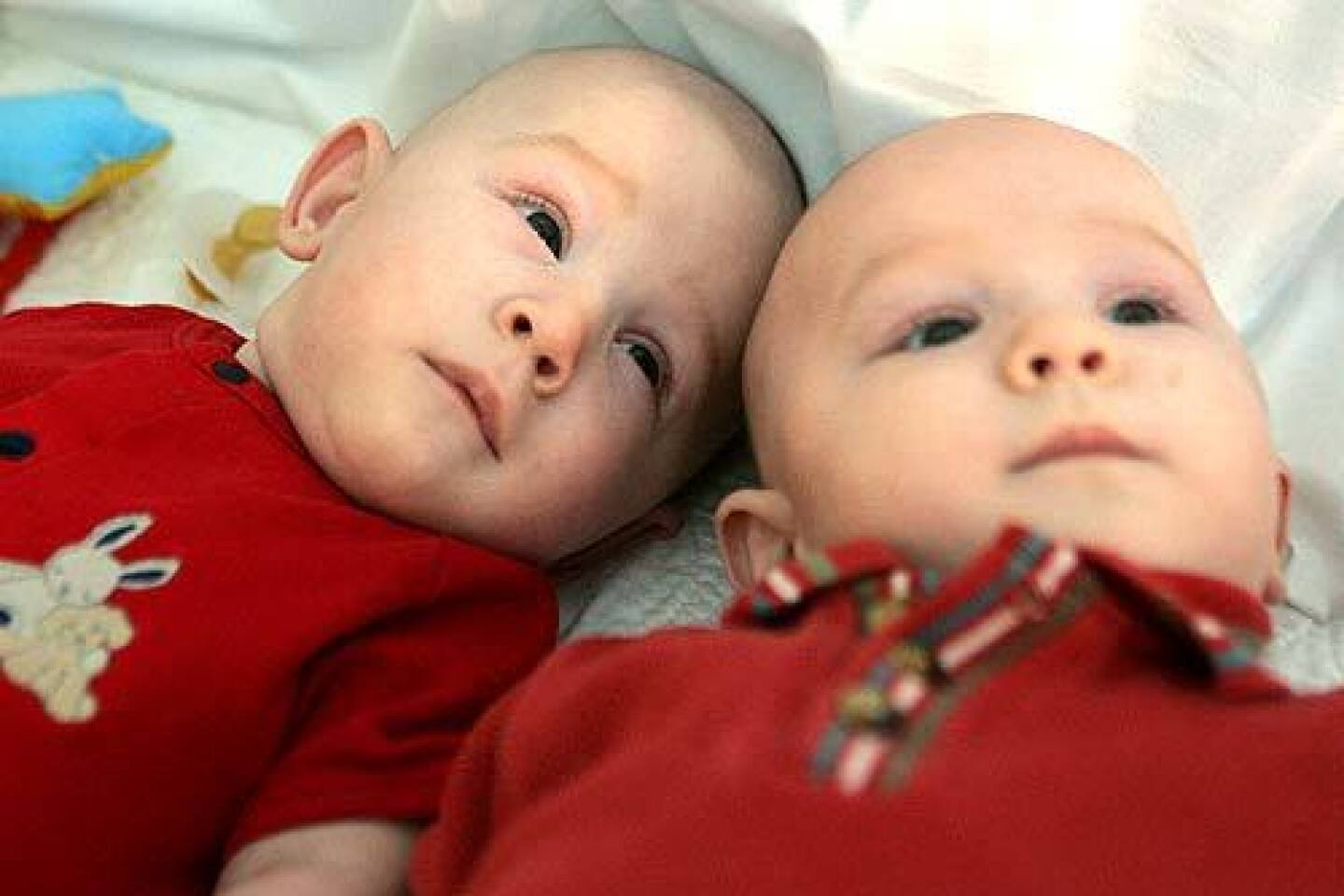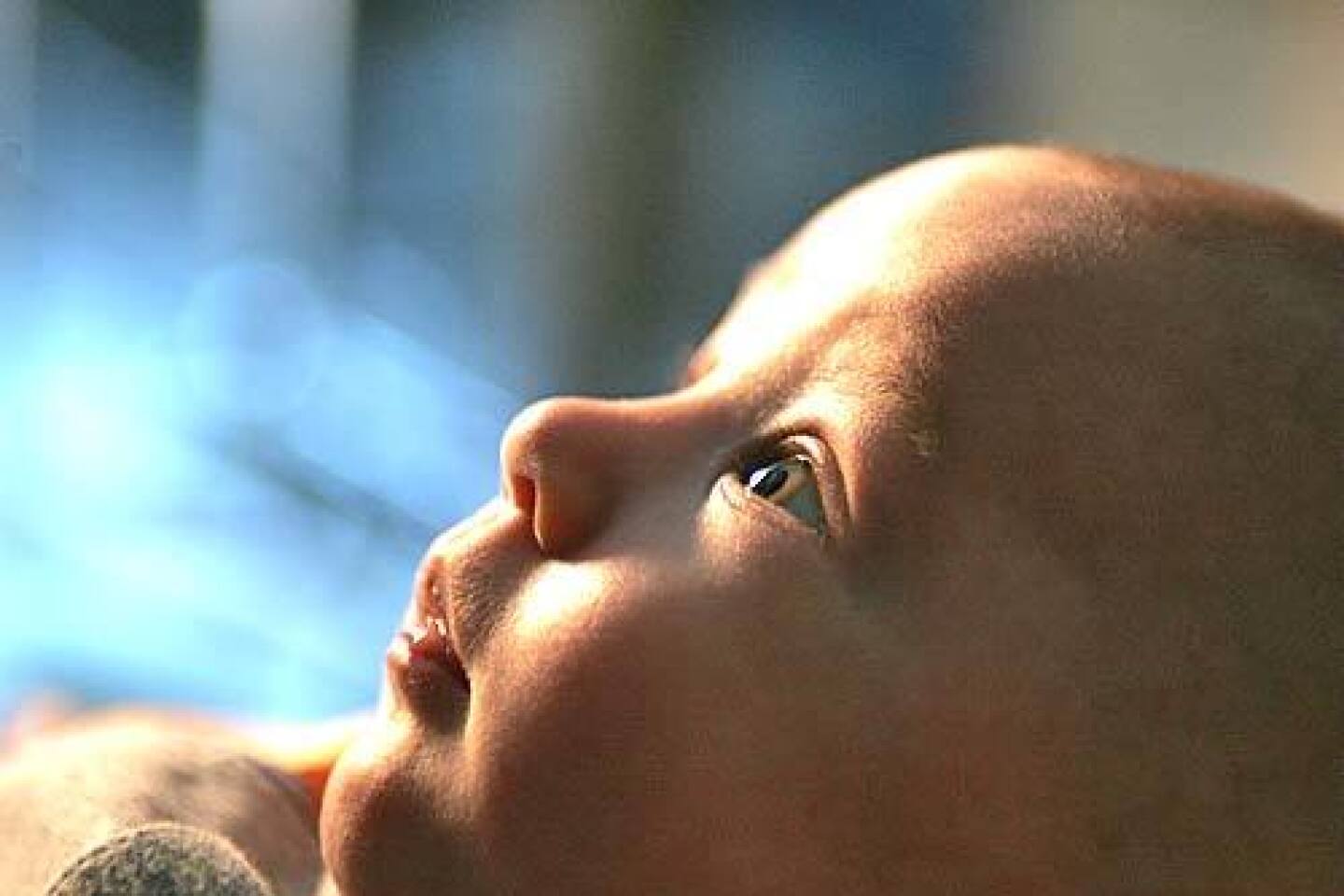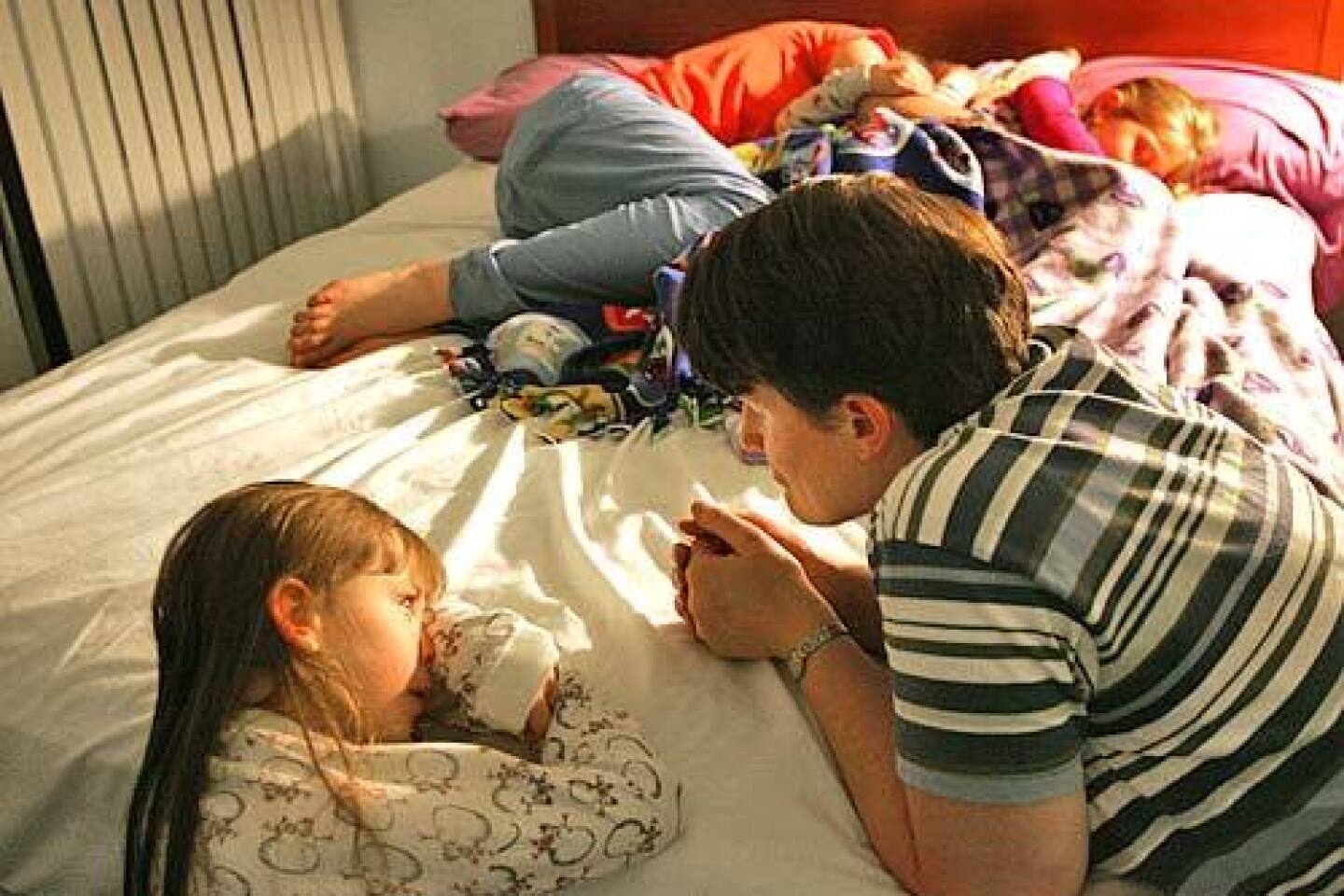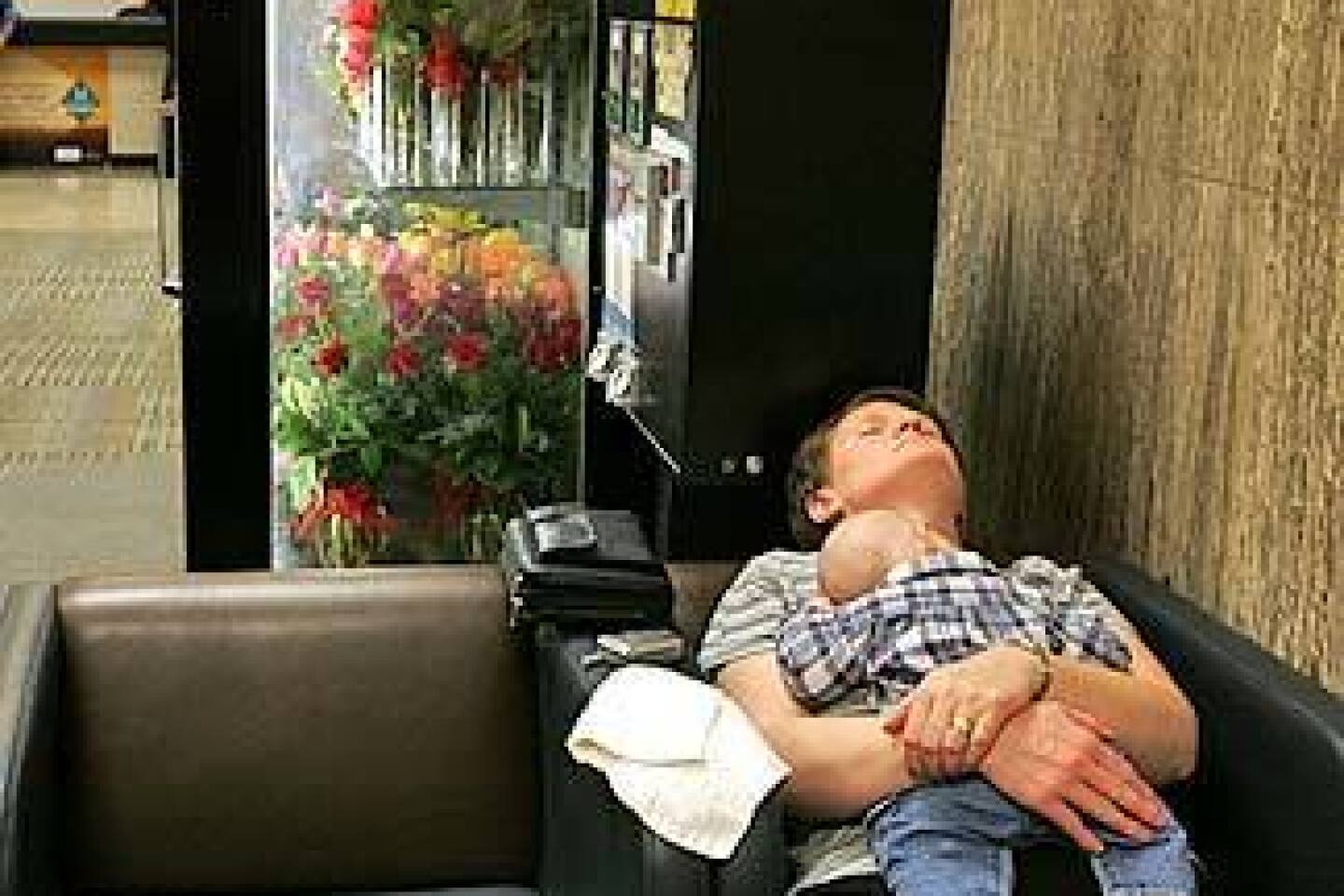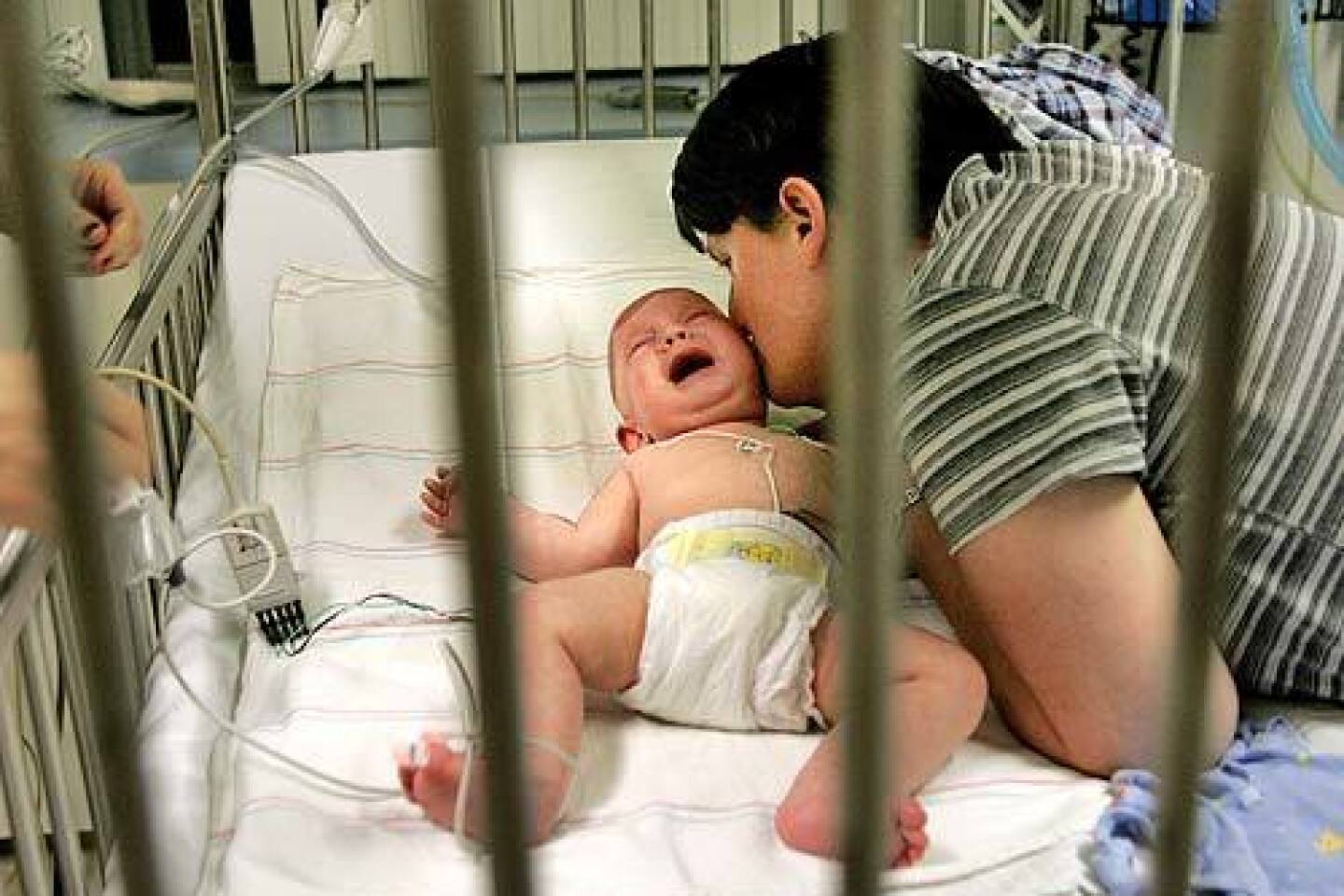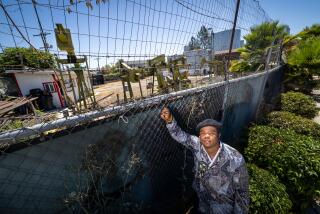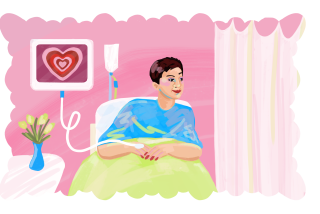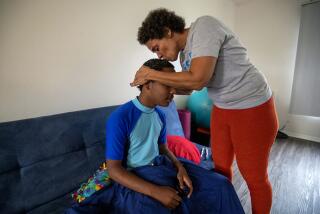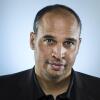For Ailing Twins’ Parents, Hope Vies With Anguish
She steered with one knee, reached into the back seat and stroked the tears from her little boy’s cheek. Drivers honked and shouted behind their rolled-up windows. One gave her the single-finger salute. She hardly noticed. She had something more important to worry about: saving her babies.
“Please, Nate,” she begged. “Hey, baby. Hey, baby Nate. Please don’t cry. Just hold on. Please, baby. Nate, please.”
It was a bright morning in November. Nicole Draper was late for a doctor’s appointment, again; winding through dense traffic, again; trying to do everything at once, again. She drove with her left hand and used her right to answer her cellphone. It was her husband. He was at home, sick from the never-ending worry.
“Honey,” she asked him, “how are you feeling?”
Baby Nate bellowed from the back seat. His chest heaved.
She dropped the phone, reached around, held a pacifier in his mouth and maneuvered the minivan down Sunset Boulevard.
Nicole hated it when Nate cried like this. She looked at me. I stared helplessly from the passenger seat.
“I’ve got to calm him down,” she said.
Nate spat the pacifier into his car seat and wailed louder.
“This is not a good sign,” she said. “Him crying like this. Not good at all.”
Finally, she pulled into the parking lot at the UCLA Medical Center. No, it wasn’t good, and Nicole knew it.
The month before, Nicole, 32, and her husband, Mike , 33, had stood alongside a brace of doctors at a news conference.
It was about the Drapers’ identical twins. Nick and Nate were 3 months old then. They would die, the doctors said, if they did not get new hearts. If they didn’t die any sooner, they would probably die when they learned to walk. Their hearts were so frail that walking would be too much.
Still, there was good news that day. Nate had been doing well enough to leave the hospital. This would be his first full day with his parents, two sisters and another brother. Two of the older kids were also twins.
Nate could stay with them, in a one-bedroom apartment at Ronald McDonald House, an hour’s drive east of the hospital, where families with sick children lived.
As long as he didn’t grow weaker.
After the news conference, I walked with the Drapers down a hospital hallway to Nick’s room. Mike picked up his little son. He spoke of how hard it was to hold everything together, how he probably couldn’t if it weren’t for Nicole. She held Nate. She spoke of how having him at home would make everything seem almost normal.
Would new hearts ever come?
That meant two other children would have to die.
Babies. Maybe toddlers.
Adult hearts, even teenage hearts, would be too big. And that meant somewhere, probably in the lobby of a hospital emergency room, a counselor would have to ask a grieving family a jolting question: May we take your child’s heart for a transplant?
The Drapers needed the answer to be yes. Twice.
If new hearts did come, then what? The transplant surgery might be too much. It kills some children. Others survive, get well and live until their bodies reject the hearts. About half live for 10 years. Then they go back onto a transplant list and wait for another heart. Or they die.
Mike said his family lived under a cloud of fear. “We have to do everything in our power to push that fear away,” he said. “Sometimes I don’t know how we do that.” He paused. “I don’t know how. Every single day....”
An Anxious Visit
And now we were taking Nate back to the hospital. He had been home at the apartment for 30 days. Would the doctors readmit him? His crying sounded serious. Nicole carried him, car seat and all, from the parking lot into the medical center, then to the third floor, where 52 of the sickest children in Los Angeles live.
The doctors weren’t ready to see Nate yet. So Nicole took him to check on brother Nick. She stood over Nick’s bed. Her frame cast a shadow on the wall. Nick was covered with blankets. Wires and tubes trailed from his right arm and right leg. The wires went to a monitor that tracked his pulse. The tubes went to clear bags of liquid drugs that kept him alive.
She took Nate from his car seat and laid him on the bed next to Nick. Neither baby cried. Slowly, she lifted Nick’s shirt. She looked at him. She felt his warm skin. With her thumb, she gently massaged his chest, just over his heart.
“It’s good when I can have them together,” she said, without taking her eyes off them. “Because every time I leave and take Nate home I am separating them. I feel like I am betraying them every time I take them apart.”
She and Nate, back in his car seat, went with Nick to the hospital basement for an echocardiogram, a high-powered examination of his heart. She heard it fill the room -- swish, swish, swish. On a black and white screen, she watched his heart labor. She saw Nick’s eyes open.
“The left side pumping chamber is four to five times bigger than it should be,” a doctor said. “He’s not getting much blood to the heart. But it looks the same as it has recently. We are happy for that.”
Nicole stood silently.
“How are you doing?” the doctor asked her.
“Fine.”
“Well,” the doctor said, searching for a way to ease her mind, “considering everything, this is good. They are both stable. That’s pretty good.”
“Pretty good,” Nicole repeated, lips tight. “Pretty good.”
Then it was Nate’s turn. She had to take him to another part of the hospital. Doctors and nurses looked at him. Sometimes there were four in the examination room at once. They weighed, measured and prodded him. They poked his tummy, listened to his lungs and looked into his eyes.
They used bells to measure how well he focused and to see if he was getting better at lifting his head. Mental development was important; babies with bad hearts often can’t get enough oxygen to their brains.
Nicole slumped into a chair. She touched Nate’s leg.
The doctors started asking questions: “Any problems breast-feeding?” “When does he wake?” “Are you giving him the blood thinner three times a day -- or five?” “And the other drugs?” “Is he tired?” “Is he fussy?” “Is he eating enough?”
One doctor was worried. “He has not gained any weight at all from the 8th to the 22nd.” Nate weighed little more than 12 pounds, hardly enough for a 4-month-old.
More doctors came.
“We need to monitor his weight gain,” one said. “You want to know that he is continuing to grow, and if he isn’t, why not? Is it a lack of calories or problems with the heart?”
Nicole fidgeted, and her eyes darted. She sighed.
If the doctors decided he was struggling too much, Nate might not be able to go back home with her.
But they said nothing. All they did was ask questions. “Is he happy?” “What are his social interactions like?” “Have you given him flu shots?”
Her eyes drifted off. She would tell me afterward that sometimes the questions -- and the advice -- just washed over her like a waterfall.
Feed Nate more, they said.
“You want me to feed him more?” She fed him at least every two hours. She gave one breast to Nate, then pumped milk out of the other to take to the hospital for Nick. “More?”
Yes, more. And watch out for anyone coughing and sneezing. Get the other kids flu shots. It would be nice to have more toys, so Nate can work on lifting his head. Here’s a brochure on diet. Here’s a brochure on the flu. If he has any problems, if he gets fussier, if he throws up, please bring him back to the hospital. Right away.
At least they weren’t going to keep him.
Among her fears, that was special. She always feared that the little gray-eyed baby she and Mike had just taken home, to brothers and sisters who knelt around him that first night as if he were the greatest of gifts, would be taken away.
The doctors kept talking.
Nicole stared at the bare wall. She looked at Nate. She bit her lip.
She laughed. Almost always she found a way to laugh when things grew tense. What else could she do?
A Devout Household
She had always wanted a big family, a clutch of kids to send out into the world to do good. A family just like her own, the Loosli clan of Provo, Utah. She was the eldest of 11 brothers and sisters, a brown-haired, firm-jawed, straight-A girl, raised in a Mormon household where nobody cursed and, after three hours of services on Sundays, everybody stayed in their church clothes all day.
She was so serious about her religion that she did what Mormon men, but far fewer women, do: She went on a mission. Nearly two years. She went to North Carolina to save souls.
That was where she met Mike Draper. He wasn’t a Mormon. He was a burly, boisterous, fun-loving 25-year-old son of the South. Sometimes he gambled, sometimes he drank, sometimes he swore and he never set foot inside a church.
Still, he was a seeker. Mike read Immanuel Kant because he wanted to. He wondered why the world was the way it was -- and how he could change it.
That was what she fell for.
She persuaded him to convert. He put his old ways behind him and accepted the strict tenets of the church. For once in his life, he felt settled, happy.
He also asked her to marry him.
When she said yes, they came up with a plan. They would move to Utah. They would have loads of kids. That’s what God would want. Babies were gifts, the church taught. They were spirits brought down from heaven.
God would be the center of their lives. Nicole demanded it.
In 1999, Caitlin was born. Twins Brendan and Emma came the next year. The Drapers moved from Utah to Phoenix for the weather. Mike went to work in the admissions department of the University of Phoenix. They struggled to pay rent on their stucco, three-bedroom home, but they were making it.
Then, last July, Nick and Nate were born -- twins again. But they had hearts that barely pumped. Dilated cardiomyopathy. The architecture of their hearts was askew. The left and right sides were in a cross-shaped jumble.
Nobody in Phoenix could treat them. They were airlifted to UCLA, one of the nation’s premier heart transplant centers.
In an odd way, a good thing happened that first week, when both babies were so close to death that their skin was a luminescent blue. Nate was so bad off, with bleeding inside his brain, that he was judged too sick to be placed on the list of children waiting for new hearts. By the time Nate was well enough for a transplant, Nick was at the top of the list.
That meant the family had dodged a painful decision. So long as both boys were healthy enough, Nick would get the first heart.
Grueling Routine
In their $15-a-day place at Ronald McDonald House, things were cramped and hectic. Mike left for work early. The University of Phoenix had transferred him to its Culver City office. His job was a lifeline: It came with insurance that covered the family. Bills for Nick and Nate had climbed to nearly $2 million.
On a typical day, Nicole rose before dawn, breast-fed Nate and placed him on the couch. She gathered two large bags that she toted on her shoulders all day long, both filled with receipts and lists of things to do -- go to Target, go to the post office, go to Vons, buy Christmas presents. She sifted through her black leather planner. She dressed the kids and gathered them around the coffee table for morning prayers, with all of them on their knees.
One of the children led: “We are thankful for our mother and father, for each other, for the babies.... We pray that they will get new hearts and that Nick will come live with us.... We pray that our daddy will feel better....”
With Nate in tow, she drove her other children to their new school. Then she drove home, put Nate back on the couch and sorted through a fat mound of bills. After school, she, Nate and the other kids drove to UCLA and spent three hours at Nick’s bedside. She left his room slowly, her eyes glistening as she closed the door.
Back in the minivan, she ate her first meal of the day: half a sandwich. As she drove, she tried to read one of the bills, unfolded on her lap. She used her cellphone to haggle over another bill. She called the hospital to ask about Nick’s weight. Then Brendan and Emma began hitting each other. Nate started crying. She jerked the steering wheel to avoid a driver who had cut her off.
“I’m sorry for being a pest,” she said into the phone, to a doctor.
“You’re not being a pest,” he replied, his voice audible from the passenger seat.
It was Milrinone.
They couldn’t take Nick home because he needed Milrinone. She spoke of it with wonder and angst. Milrinone kept Nick’s heart beating. Milrinone kept his veins open. Milrinone was keeping him alive. But Milrinone, administered intravenously, was why they couldn’t take him home.
“Is there any way we can wean him off the Milrinone?” she asked.
“He did not do well when we tried to wean him off Milrinone the last time,” the doctor replied. “It’s not wise to try it again.”
“OK,” Nicole said. “I hope you don’t think we are bothering you too much.”
She put down the phone and drove through the traffic on Sunset. She shook her head and broke the silence with a single word.
“Milrinone.”
Thanksgiving was just days away. Dr. Juan Alejos, the pediatric cardiologist who was overseeing the twins’ care, had given his blessing: The Drapers could go home to Phoenix for the long weekend. And Nate could go with them.
It had been a difficult decision. If a heart became available during the holiday, it would go to Nick, who was in the hospital. Doctors could operate without his parents. But what if there were two hearts?
“I worry about a heart coming up for Nate, and they are in Arizona, and they can’t get here fast enough,” Alejos told me. “We lose our opportunity for a transplant, because they are in Phoenix. They couldn’t get here in time. Their chance would be lost, and that is the scary part, because that may be your only call. You may never get another call.”
On the other hand: “I know how important this weekend is for them.” He crossed his fingers. “Just to have some sense, for just a little while, that everything is normal.”
A Chance for Renewal
The Drapers drove across the desert in the middle of the night to get to Phoenix in time for the holiday. At 3 a.m., they walked through their garage door and into the kitchen. On the table were platters of potatoes and muffins and a big stuffed turkey. Friends from church had put the meal together as a surprise.
When they woke up, all they had to do was put everything into the oven.
On Thanksgiving night, they sat at the dinner table. Everything did seem normal. Mike said he was thankful for Nicole. Nicole said she was thankful for Mike. Brendan said he was thankful for the food. Caitlin for Phoenix. Then Emma said what they were all thinking: She was thankful for Nick and Nate and that they were still alive.
Caitlin’s friends came for a sleepover. The house filled with shrieks and laughter. Mike, in the middle of the children, sneaked around a corner, playing tag. “Man,” he told me, “this is the way I usually am.” He thought about stuffing himself into a closet where he usually hid when he played with the kids. “My old self. Just one big kid....”
One of them chased him. “Tag, you’re it.”
“I’m it?” he said, grinning. “No, you can’t get me like that. You’re it!”
Then everyone sat around him, and he embellished a fairy tale. Nicole and the kids started laughing.
They couldn’t stop.
It was a way to forget. But it wouldn’t last.
One evening in Phoenix, Mike and I went out to pick up pizza for dinner. As he drove, he spoke:
Stress was weighing him down; he worried that his family felt it. Sometimes he snapped at Nicole and the kids. Then he’d tear himself up: They didn’t deserve it. Not now, not ever. When the other kids were born, he’d been a nervous wreck, worried that they’d have a debilitating illness or a terrible handicap. Maybe he couldn’t be a good father to a child like that.
Then, when Nick and Nate were born, during that first weekend, when each breath was a struggle, when all that kept them alive were the drugs that dulled them, when Nate faced the likelihood of brain damage, then he had caught himself telling his own parents: Maybe it would be more humane if they didn’t make it.
Maybe it’d be best if they didn’t have to go through so much suffering. If they were going to die so young, maybe they should die that weekend.
But now it was all different. Now he was consumed with keeping them alive, with watching them grow. He wanted to take care of them, no matter how they turned out. “All I want is for those two boys to live.” His eyes glistened. “Gosh, I just want them to live.”
There were times, he said as he drove, when he grew terribly depressed, down on himself for not being stronger, for failing to live up to what he thought a strong father, a strong Mormon father, should be.
He wasn’t a rock, and he’d admit it. There were mornings when he could hardly lift the covers, days when he could barely make it out of bed.
He was sapped of strength. Sometimes he couldn’t muster the energy to go to church or even to work. He was worried about what his boss thought. He couldn’t afford to screw up at work. Work meant health insurance for the boys.
He was plagued by doubts. Sometimes he wondered if something he had done before he became a Mormon was coming back to haunt him. Like a kind of curse.
Other times he was afraid he might end up keeling over. His blood pressure and his cholesterol were sky high. He had gained 50 pounds since summer, numbing his pain with junk food. His gut hung over his belt like a sack.
“Nicole,” he told me on another occasion, “she’s so perfect.” She handled this with so much strength. She just kept going and going and going. She was holding the family together. She had a faith that ran deep into her marrow. And then there was the way she dealt with going to the hospital. Every day. So strong. It’d be a week, sometimes, between his visits to Nick.
It hurt too much to see him in there.
“Sometimes I gotta put on a game face for the family, for the kids. Some days I don’t feel like putting on a game face. I’m looking for the motivation, but it is not there sometimes. I’m just not motivated enough for what we have to face.
“I compare myself to where I should be, what I should be. People come up to me all the time and say, ‘Hey, man, you are handling this so well. You’re strong.’ I’m not feeling strong.... That is eating me up. There’s times when I don’t feel I can make it.”
Still later, he told me: “It’s just that every once in a while I am overloaded with these emotions, and sometimes I just need some time, some space, to recharge the batteries. But I will get through this. I have to. I cannot ever let my family down.”
The night after Thanksgiving, Mike and Nicole sat on their living room couch. Nate slept in his car seat, and the other kids slept on the floor at their feet.
It was nice, Mike would tell me afterward, but what about Nick?
To Nicole, that was hard.
Maybe they should have stayed with him in Los Angeles. He hadn’t seemed the same since they’d taken Nate away from him. And here they were, having so much fun. It seemed that Nick knew he was alone and that he hated it.
That night, on the couch, hundreds of miles away from him, Nick’s parents held each other and cried.
Warned of Surgery’s Risks
Nick had difficulty lifting his head. His skin had less color than Nate’s. He was smaller.
His IV, dripping Milrinone, caused problems. Doctors and nurses had to reposition it constantly in his tiny veins. By early December, the places where the needles went in were purple and scabby. The doctors decided to implant a catheter into his chest to create an IV port that wouldn’t require sticking and poking.
The port required surgery.
Five hours before the operation, Nicole was at her baby’s side.
“Hi, Bud,” she said. She placed Nate, in his car seat, on the floor beside Nick’s bed. “Bud, how are you doing, baby?”
Nick cooed and clenched his fist.
She put a pacifier in his mouth and looked right into his eyes. “Bud, are you ready? Everything will be OK.”
All morning and into the afternoon she rocked him on her chest. Finally, an anesthesiologist came in and stood over her. “We need your permission to do this,” he said. “We will give him medications to keep his signs normal....”
Nicole smiled and nodded.
“We don’t anticipate any problems.... But in some situations, the worst that can happen does.”
“OK,” she said, softly.
“That includes heart attack and stroke.”
She nodded. “OK.”
She laid Nick on his bed. She picked up her cellphone and called Mike. He had been too despondent to go to work -- or anywhere else.
Nurses came to wheel Nick’s bed out of his room and down a hallway to surgery. Nicole asked if she could hold him again. As she walked, she cradled his head near hers. She kissed his cheeks and whispered in his ear. “Love you, love you, love you.”
She shuffled down the hallway, 30 small steps. It took a full minute.
At the operating room, she handed him over.
She carried Nate out to the minivan. She had other kids to tend to and a court appearance to prepare for. The doctors, she told me, reassuring herself, did not anticipate any problems. “They say this is something they do all the time.”
God would be there with Nick, she said. Everything was in God’s hands. Even if something terrible happened, she was sure that she’d see Nick one day in heaven.
She fastened Nate into the back seat.
“I just can’t think about it. Thinking about it is too depressing. That’s the reason it is good for me to be busy. If I wasn’t so busy, I would have too much time to think.”
Mike was not the only one with misgivings.
“What I have wanted to do my whole life was to be a mom,” she would tell me a few days later. “A good mom and a good wife. That is what is most important to me.”
And now, she said, she was trying “to figure out how to be a good mom to kids who I can’t even be with very much -- or if I am with them a lot, I am ignoring my other kids.”
Sometimes, she said, she felt as if she were shortchanging all of her children and Mike as well. She worried about “the stress that it puts on our relationship.... I feel like I am not doing enough or being the kind of mom -- or wife -- I want to be to any of them....
“I am not doing the job.”
Somehow, though, there always seemed to be a reprieve.
Before the day was out, a doctor called to say that Nick’s surgery had gone just fine.
Power of a Father’s Touch
Maybe court would too.
A highway patrolman had pulled her over. It was in Indio, before Nate’s release from the hospital and Mike’s job transfer to California. She was going to Phoenix to see him.
She had been speeding: 85 miles an hour.
Nicole; her mother, who was with her; and the officer, through his spokesman, would recall events this way:
He asked for her driver’s license, and she searched for it. She knew it was in her black leather planner, along with her credit cards, checks, phone numbers and a pass that allowed her to enter Mormon temples. Then she realized that she had left the planner at a Burger King near UCLA.
Tears came. She trembled.
The officer waited.
On her cellphone, she tried to call the Burger King.
The officer looked at her older kids in the back seat. He would recall noticing that they were not wearing their seat belts.
She would recall trying to tell him that the kids had indeed been wearing their seat belts but that they had slid the shoulder straps down behind their backs -- and that her planner, with her driver’s license and a lot of other important things inside, was probably at a fast-food restaurant near a hospital in Los Angeles. She absolutely had to find it.
Suddenly, everything she had been going through for two months flashed through her mind. The hospitals, the doctors, the twins, the worry, the waiting, the prayers that were only half answered: Nick and Nate were still alive, but they were barely hanging on.
The highway patrolman wrote a ticket. She stared at it. Speeding, driving without a license, having passengers without their seat belts on.
It would cost $450.
“I just lost it then,” she told me afterward. “Everything seemed to come together and crash on me. Everything.”
Now it was Dec. 7, and it was time to pay.
Nicole, her sister, Nate and the other kids drove back out to Indio to try to challenge the ticket. The had to. The Drapers couldn’t afford $450.
In court, they waited. And waited. The highway patrolman didn’t show up. And, just like that, the judge threw the ticket out.
I’d hardly ever seen her so excited. She called Mike. “Hi, Hon. Guess what? We got off scot-free! We don’t have to pay a thing. Isn’t that sweet? The officer didn’t show. I guess he didn’t want to come to court and face that crying woman again.”
“Good for you, Bud,” Mike boomed.
“Talk about an early Christmas,” she said. “The only thing that could be better is if we could bring Nick home for Christmas.”
“I know, I know,” he said. Maybe they were on a roll. “Maybe that will happen.”
That night, Mike went with her to the hospital.
He tugged at his shirt and wiped sweat from his forehead. “It’s going to be weird seeing him with that thing sticking out of his chest,” he said. “I hate this.”
He walked ahead forcefully, marching toward battle. “OK,” he muttered. “OK, I can do this.... Everything is going to be all right.”
He strode into Nick’s room and stood over his bed. The only sound was the beeping of a heart monitor. At first, he couldn’t look at his little boy. Then he did.
“He looks the same as always, right?”
Nicole nodded.
With a thumb, he flipped up his son’s shirt. Nick now had five small patches on his chest, in an arc. Near his right shoulder, protruding from his skin, was a plastic portal. It was a catheter, no larger than a dime.
“He looks the same,” Mike said, “only now he has something in his chest.”
The monitor showed that Nick’s heart was beating 140 times a minute, a bit fast, but in the normal range for babies.
Mike bowed his head.
“Buddy, we are here. It’s your daddy.”
Nick looked up at his father’s face.
Mike stroked his baby’s head, caressed his chest, rubbed his stomach softly and kissed him. He put a thumb near Nick’s hand. Nick wrapped his fingers around it.
“Buddy, we are here,” Mike said, “and we love you.”
The heart monitor registered a change. Down to 138 beats a minute.
Mike kissed his boy, then kissed him again.
The monitor read 135.
“We love you, Buddy.... You’re gonna get out of here soon, little buddy.”
Nick’s heart rate settled: 130 beats a minute.
‘This Is My New Life’
Dec. 15, a Thursday, began normally.
Then Nicole, up early, noticed something. Nate seemed hot. He wasn’t hungry. One moment, he was agitated. The next, he was lethargic. The next, he slept.
As the morning went along, his skin got hotter.
She telephoned Mike at work and asked him what she should do. He didn’t know, but now he was worried too.
By midafternoon, she was on the phone to him again. Maybe she should call the hospital. It might be nothing, but the doctors always said to call the moment she noticed any change.
It was risky: Milrinone. They might want to keep him.
But Mike and Nicole decided there was no choice. She had to make the call.
Bring him in, a doctor said. Bring him in right away.
Mike met her and Nate at the hospital. While they waited for someone to examine Nate, a doctor walked in with news about Nick. “He’s not gaining the greatest weight in the world,” the doctor said. Nick needed a feeding tube, through his nose.
Mike and Nicole were stunned.
“So what you are saying is the little guy needs a heart transplant fast?” Mike asked, trying hard to grasp what was happening. “His little body is screaming out? He’s saying, ‘Look, I’m not able to handle this much longer.’ ”
Yes, the doctor said, he needed a new heart as soon as possible. But he hadn’t slipped badly. He was holding on.
Mike put his hands over his face.
Nicole stared at the ceiling.
Another doctor walked in. He was there to see Nate. He said Nate would be given another echocardiogram. “It may be,” the doctor said, “that everything looks great and we send him home tonight.”
They also might keep him. Milrinone.
Nate was on his back, shirt off, crying. His parents stood over him, trying to calm him as the doctor watched his heart on a screen.
Alejos, the cardiologist, joined them. “Ejection fraction is 28,” he said. “That’s down.”
Mike frowned. Nate’s heart was pumping less than half the normal amount of blood.
“I’m sorry,” another doctor said. “He has to stay with us.”
Mike leaned his shoulders against a wall. He looked up and breathed out hard.
Milrinone?
Not at the moment, the doctor said.
There were no vacant beds, so Mike left for a late meeting with a college applicant.
Nicole sat in the lobby with Nate next to her in his car seat.
Another doctor walked up. “Dr. Alejos said, ‘Start him on Milrinone.’ ”
Silence.
“Milrinone?” Nicole said. She closed her eyes and leaned her forehead against an IV pole on an empty wheelchair. “Milrinone?” Silence again. “Does that mean he’ll be on it for a while, that he will have to stay longer?”
“The ideal situation is he would turn around and get better.”
Nicole pursed her lips. Her thoughts turned to how long he would have to stay. “They said the best case is 24 hours originally. What’s the best case now?”
“Three to four days.”
She called Mike. “Oh, man, honey, Dr. Alejos said they need to start him on Milrinone. They are putting him back on the third floor, honey. Milrinone, honey. This is scary.”
She carried Nate up to the third floor. Intensive care. Nurses attached wires, and his heart rate began to show on a digital display: 143.
Nate’s fists were clenched. Nicole held his left fist in her left hand. A doctor touched Nate’s chest with a stethoscope. Nate wailed. His heart rate climbed: 146, 152, 173.
“I love you,” Nicole whispered into his ear.
The doctor found a vein in the crook of his arm and stuck a needle in.
Nate bellowed.
The doctor pulled back, then tried again.
Nate cried louder.
The doctor wiped tears from Nate’s cheek. “Excuse me, baby. Excuse me.”
With each poke his heart rate zoomed: 209, 210.... Nicole looked at the monitor. 211, 212.
Could his heart handle this?
Finally, the doctor backed off. She said she would try again later. She told Nicole to go home and get some rest.
It was midnight. Nicole and I walked across the hospital parking lot toward the minivan.
Her shoulders sloped. She struggled to hold back her tears. “To see a happy baby that looks all right, and to have just one sick day, and suddenly you have to go to the hospital, and now we don’t know when he will be back with us.... “
She shook her head and worked to stand up straight.
“This is my new life. My life will never be the same.”
She was carrying the car seat. It was empty.
Three to four days have stretched into weeks. He now shares a room with Nick on the third floor of the Mattel Children’s Hospital at the UCLA Medical Center. They have hardly grown over the last four weeks. They are not eating much, and they are fussier than ever -- a sign, doctors say, that they are not feeling well.
Mike and Nicole and Caitlin, Emma and Brendan pray every day that Nick and Nate will get new hearts soon.
*
Kurt Streeter can be reached at kurt.streeter@latimes.com.
More to Read
Sign up for Essential California
The most important California stories and recommendations in your inbox every morning.
You may occasionally receive promotional content from the Los Angeles Times.
